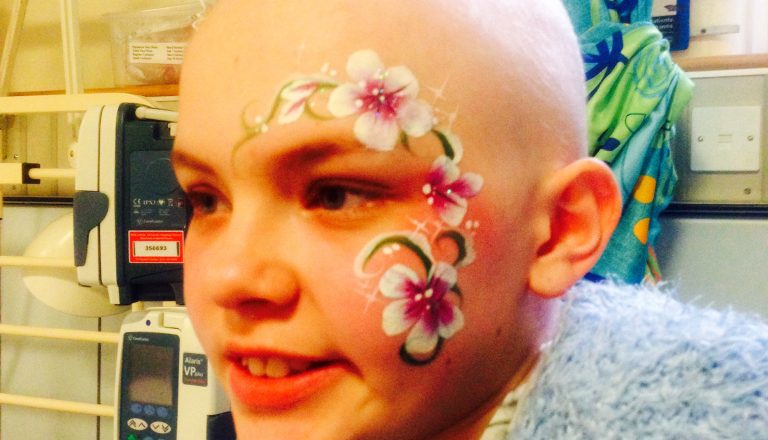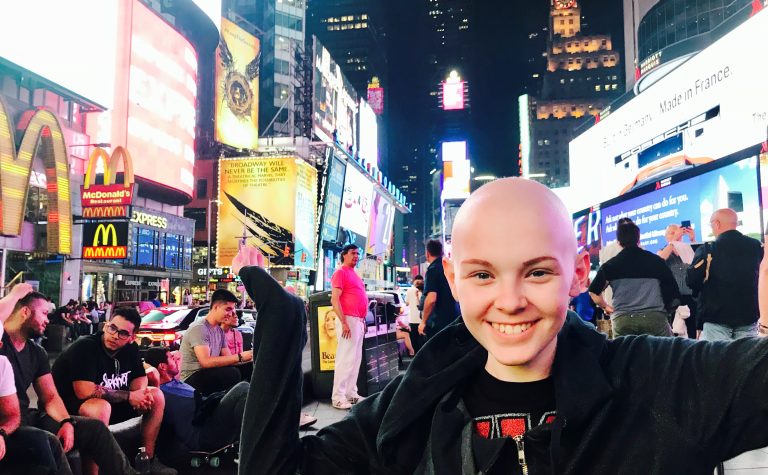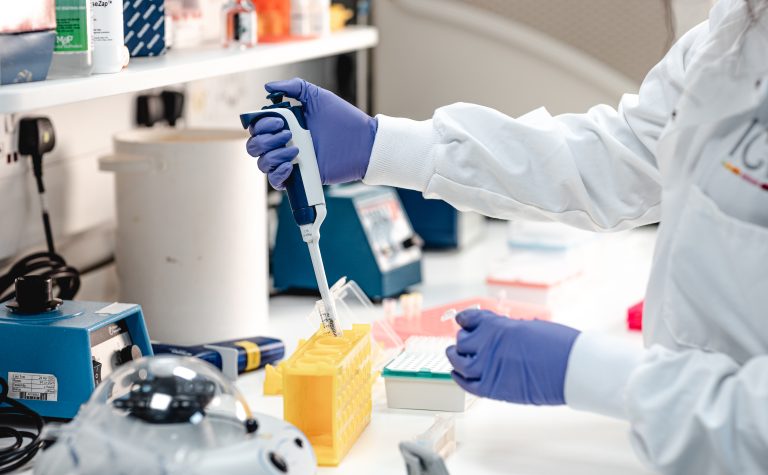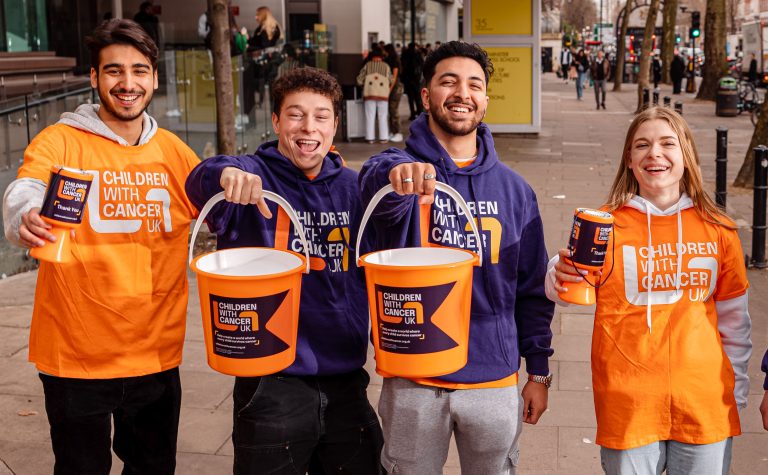Kira Noble from Edinburgh was one of the first childhood cancer patients in the UK to benefit from the Stratified Medicine Paediatrics (SMPaeds1) research programme, which uses a simple blood test to better understand children’s cancers and pave the way for new targeted and less toxic treatments. Today, at 21, she shares her childhood cancer journey and the profound impact the SMPaeds1 research project has had on her life.
Researchers from the Institute of Cancer Research, London, showed that a liquid biopsy, which is a simple blood test, can find tumour DNA (ctDNA) which can give a better picture of how a tumour changes over time. This test, and others like it, are still in research testing, but in the near future, it should be possible for doctors to use them to understand the cancer’s development without needing invasive biopsies. The research was co-funded by Children with Cancer UK and Cancer Research UK and was recently published in the Journal Cancer Discovery.
In 2014, 11-year-old Kira was diagnosed with neuroblastoma when an ultrasound scan found a large mass the size of a watermelon in her abdomen. Over the next 10 years, Kira went through different childhood cancer treatments, including high-dose chemotherapy with autologous stem cell transplant, four major abdominal surgeries, conventional radiotherapy and proton beam therapy. Despite these aggressive cancer treatments, Kira relapsed eight times.
Her mother, Aud, said:
Once neuroblastoma relapses, there is no known cure and there is no designated treatment path set out to follow.
In January 2019, the proton beam therapy Kira underwent devastatingly had not worked and the cancer continued to multiply and spread. We made the pivotal decision to try a drug called Lorlatinib that was previously used in adults but had never been used in children in the UK. Kira was also enrolled into SMPaeds1 serial blood testing, which would track her response to the targeted treatment. She was one of the first children in the UK to trial this.
Sadly Kira’s cancer progressed further at the end of 2021. Her liquid biopsy showed that the ALK gene mutation, which was causing her cancer to multiply and grow, was still there and had in fact increased in her blood. She wasn’t responding to the inhibitor in the way they hoped – so her treatment was changed. It was important to keep using the ALK inhibitor and add in chemoimmunotherapy. After six months of doing this, the tumour became inactive and has stayed that way. Her blood tests now show no detectable mutations.
Kira’s story is an important example of Precision Medicine having the desired effect on cancer and it’s given her the opportunity to live life as a typical 21-year-old.
We are hugely grateful to Children with Cancer UK and Cancer Research UK, for investing invaluable funds into SMPaeds1 serial blood testing to help all children with relapsed cancers. We believe it will make a positive difference to outcomes for children living with cancer.
Kira said:
Having cancer nine times has undoubtedly shaped me, but I still live life large at every opportunity. I always squeeze the joy out of life as I go in between treatments.
Amar Naher, Interim CEO of Children with Cancer UK, said:
We want to thank Kira and her Mum, Aud, for their courage and willingness to share their journey with childhood cancer that inspires us all. Thank you for helping us raise awareness and support those affected by cancer.
We’ve seen how breakthroughs in childhood cancer research can make a significant difference to the survival chances of every child facing cancer. Our mission is to create a world where every child and young person survives their cancer diagnosis. Investing in impactful research like SMPaeds1 help us unlock kinder, targeted cancer treatments for young patients. Every breakthrough brings us closer to saving lives and improving the quality of life for those affected by cancer.
Dr Laura Danielson, children’s and young people’s research lead at Cancer Research UK, said:
We’re excited about this new research from the SMPaeds programme revealing the potential use of less invasive blood tests to better understand solid tumours in children and young people. We’re proud to fund innovative research like this, which is unlocking new ways to study and potentially treat childhood cancers to give young cancer patients, like Kira, the best possible chance to live long, healthy lives.
The second phase of the research programme, SMPaeds2 – also co-funded by Children with Cancer UK and Cancer Research UK – is currently underway and aims to develop and study new tests that will build upon the success of the first phase of the programme. SMPaeds2 will investigate blood cancers and solid tumours in children and young people, including in the brain, muscle and bone, which can be more difficult to access, diagnose and treat.
About Children with Cancer UK:
Children with Cancer UK is the leading children’s cancer charity in the UK. Our vision is a world where every child and young person survives their cancer diagnosis. Our mission is to improve survival rates and the quality of survival in young patients, and to find ways to prevent cancer in the future. We are dedicated to raising and investing funds into vital research that helps us understand childhood cancers and improves treatments. We support families as they navigate treatment and life beyond cancer. What began as a small memorial charity in 1988, has evolved into a leading childhood cancer charity raising more than £300 million and investing in over 300 pioneering research projects.
About Cancer Research UK for Children & Young People:
Cancer Research UK is the world’s leading cancer charity dedicated to saving lives through research, influence and information.
Cancer Research UK for Children & Young People is the part of Cancer Research UK dedicated to driving progress for 0-24-year-olds with cancer.
Cancer Research UK is the biggest charitable funder of research into children’s and young people’s cancers in the UK.
Together with its partners and supporters, Cancer Research UK for Children & Young People is driving forward progress to ensure more children and young people can live longer, better lives, through more effective and less toxic treatments.
In the last 50 years, Cancer Research UK has helped double children’s cancer survival in the UK. Today, more than 8 in 10 children and young people (aged 0-24) diagnosed with cancer in the UK now survive for at least ten years.
Money raised through Cancer Research UK for Children & Young People will be used to fund research into cancers affecting children and young people (aged 0-24).
For more information, please visit www.cruk.org/children-and-young-people or follow us on Facebook.
About The Institute of Cancer Research, London:
The Institute of Cancer Research, London, is one of the world’s most influential cancer research organisations.
Scientists and clinicians at The Institute of Cancer Research (ICR) are working every day to make a real impact on cancer patients’ lives. Through its unique partnership with The Royal Marsden NHS Foundation Trust and ‘bench-to-bedside’ approach, the ICR is able to create and deliver results in a way that other institutions cannot. Together the two organisations are rated in the top four centres for cancer research and treatment globally.
The ICR has an outstanding record of achievement dating back more than 100 years. It provided the first convincing evidence that DNA damage is the basic cause of cancer, laying the foundation for the now universally accepted idea that cancer is a genetic disease. Today it is a world leader at identifying cancer-related genes and discovering new targeted drugs for personalised cancer treatment.
The ICR is a charity and relies on support from partner organisations, funders and the general public. A member institution of the University of London, it is one of the UK’s leading higher education institutions, placing first for biological sciences and second overall in the definitive ‘REF2021’ rankings of UK university research quality, impact and environment, and provides postgraduate higher education of international distinction.
The ICR’s mission is to make the discoveries that defeat cancer.
For more information visit ICR.ac.uk
Press Enquiries:
For all press enquiries, please email media@childrenwithcancer.org.uk or call 0800 222 9000 and ask for the media team.




